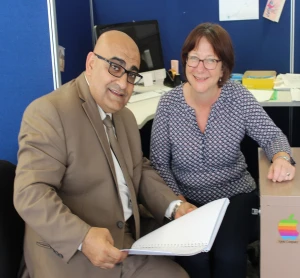Lead Principal Investigator: Dr Carol Murphy
Co-Lead Principal Investigator: Dr Abdullah Abu-Tineh
Principal Investigators: Associate Professor Nigel Calder & Dr Nasser Mansour
Project Dates: August 2016 - August 2019
Project background

Naim Balasmeh & Dr Carol Murphy
Instruction in science and mathematics often lacks practical experience and a reduced emphasis on critical thinking and inquiry-based activities. Such instruction can result in a perceived lack of relevance of the skills and knowledge of science and mathematics to student's immediate view of the world. In England studies have shown that pedagogical strategies based on exploratory talk can support students' collaboration, engagement and attainment in science and mathematics. Furthermore, in New Zealand, research has focused on the promotion of inquiry-based integrated curriculum and the use of digital technologies.
Why was the research undertaken?
To develop a Professional Development (PD) program based on research informed didactic strategies to enhance Inquiry-based learning within the context of Qatari science and mathematics middle school classrooms.
What were the main goals of the research?
The main objectives for the project were:
- to build a professional development intervention that utilised specific didactic tools to transform teacher practice towards a dialogic inquiry-based approach;
- to evaluate the impact of the intervention on classroom practice and student motivation within the national context of Qatari mathematics and science education;
- to investigate mediating factors and analyse the relationships between these factors and the impact on classroom practice and student motivation;
- to build capacity through the training of professional development specialists, and maintain this expertise through the development of project schools as specialist learning centers in mathematics and science in Qatar; and
- to disseminate findings and resources through project websites to impact on practice, through NCED reports to policy makers in Qatar, and through research conferences and academic journals.
What was/were the main methodology/ies used to capture data?
The project evaluated a school-based professional development intervention using blended research methods. An outcomes-based mixed-method evaluation focused on determining where transformation of classroom practice resulted from the professional development intervention. A cross-case analysis of the schools involved in the project was carried out, thus allowing comparative analysis of the teachers and students in the schools to anticipated outcomes. Quantitative data was analyzed using SPSS and qualitative data was analyzed thematically using NVivo.
What do you consider to be the key findings from the research
- For PD to be effective in transforming pedagogy it should go beyond the presentation of principles and didactic strategies and provide ongoing classroom support for implementation.
- WebQuests can target learning objectives in mathematics and science and develop students’ self-learning skills.
- A range of resources in WebQuests and discussion in groups can promote deep understanding, develop critical thinking skills and meet the needs of different students.
- Whilst overall there was a significant improvement in students’ attitudes to science or mathematics, the improvement could be related to students’ positive pre-dispositions to self-learning and group discussions.
- The introduction of WebQuests and group discussions were not appreciated by some students who may have lacked tolerance towards the ambiguity of self-learning and discussion.
- Students appeared to have predispositions towards the use of WebQuests in relation to desirability, approbation, and appreciation that were confirmed rather than changed following the PD program.
- School learning centers can be effective in disseminating practice to other schools. The opportunity to build on teachers’ own experiences in the school learning centers was a key strength in moving beyond the knowledge of “what to do” to the expertise of “how to do it.”
What groups and/or organisations would be most interested in your research results?
- Ministries of Education
- Colleges of Education
- Schools
- Professional development learning providers
- Teachers
- Science and Mathematics education professional groups
Implications for practice
- We recommend that policy makers, in Qatar and internationally, consider the successful aspects of the PD in this study. We wish to emphasise the need for ongoing classroom-based support. It seems that it is not enough for teachers to know about the principles of didactic strategies, they also need support to apply the strategies in practice and to overcome challenges and stress factors.
- Schools can be effective learning centers in disseminating practice and could be used within school clusters where effective practice and demonstration lessons can be shared.
- This study involved in-service teachers. Research is needed to evaluate the use of such specific didactic strategies with pre-service teachers in initial teacher education programs.
- This study involved both WebQuests with exploratory talk as a way of encouraging collaborative inquiry. In doing so it was not possible to distinguish the impact of each didactic tool. Further research into the use of each of the tools separately could help to identify the contributing factors. In addition, further research could compare how other didactic tools impact on transforming pedagogies.
- Research is needed on overcoming challenges by focusing further on teachers’ management strategies, including their use of discourse and questioning.
- Further research is needed into students’ and teachers’ predispositions and emotional traits into inquiry-based practices and how these predispositions relate to challenges and stress factors.
- In this study, teachers experienced issues with digital technology, both in relation to limited access in computer labs and access to Arabic resources. Schools might consider how to use digital technology more flexibly to build students’ skills and enable more access. Further searches are needed to identify appropriate internet sources that target key learning.
